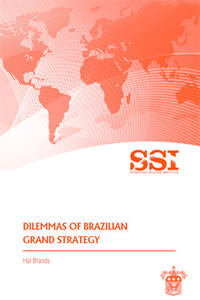Dilemmas of Brazilian Grand Strategy

Authored by Dr. Hal Brands.
August 2010
86 Pages
Brief Synopsis
This monograph analyzes Brazilian grand strategy under President Luiz Inácio Lula da Silva. During Lula’s nearly 8 years in office, he has pursued a multi-tiered grand strategy aimed at hastening the transition from unipolarity to a multipolar order in which international rules, norms, and institutions are more favorable to Brazilian interests. Lula has done so by emphasizing three diplomatic strategies: soft-balancing, coalition-building, and seeking to position Brazil as the leader of a more united South America. This strategy has successfully raised Brazil’s profile and increased its diplomatic flexibility, but it has also exposed the country to four potent strategic dilemmas that could complicate or undermine its ascent. These dilemmas touch on issues ranging from anemic macroeconomic performance to rising tensions in Brazil’s relationship with the United States. In the future, the efficacy of Brazilian grand strategy—and its implications for U.S. interests and the global system—will be contingent on how Lula’s successors address these dilemmas.
Summary
This monograph analyzes Brazilian grand strategy under President Luiz Inácio Lula da Silva. During Lula’s nearly 8 years in office, he has pursued a multipronged grand strategy aimed at hastening the transition from unipolarity and Western economic hegemony to a multipolar order in which international rules, norms, and institutions are more favorable to Brazilian interests. Lula has done so by emphasizing three diplomatic strategies: soft balancing against the United States, building coalitions to magnify Brazilian negotiating power, and seeking to position Brazil as the leader of a more united South America.
This strategy has successfully raised Brazil’s profile and increased its diplomatic flexibility, but it has also exposed the country to four potent strategic dilemmas that could complicate or undermine its ascent. First, issues like poor infrastructure, rampant crime, and excessive taxation and regulation of the economy may impede Brazil from attaining the strong economic growth and social cohesion necessary to sustain such an ambitious strategic project. Second, in dealing with South America, the Brazilian political class has not reconciled its desire for regional leadership with its unwillingness to share power or economic benefits with its neighbors. As a result, many of these countries perceive Brazil’s diplomacy to be domineering and its trade policies to be narrowly self-interested, and they have thus refused to support Lula’s bid for regional preeminence. Third, at the global level, the long-term cohesion and effectiveness of Lula’s various diplomatic partnerships is open to question. Fourth, while Lula has maintained good relations with Washington, his grand strategy unavoidably entails a growing risk of conflict over issues like Iran, trade policy, and the U.S. diplomatic and military role in Latin America. Looking ahead, the efficacy of Brazilian grand strategy—and its consequences for U.S. interests—will be contingent on how Lula’s successors address these dilemmas.
Access Full Report [PDF]: Dilemmas of Brazilian Grand Strategy
|
NEWSLETTER
|
| Join the GlobalSecurity.org mailing list |
|
|
|

